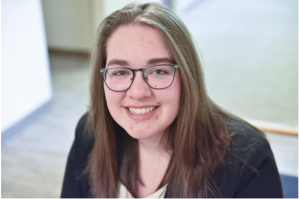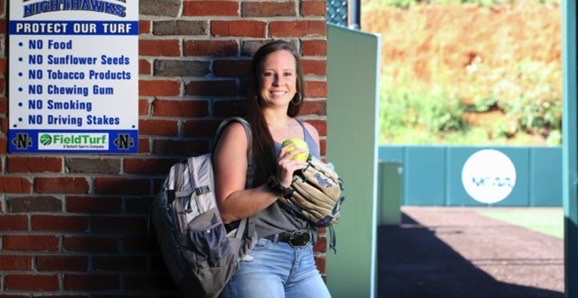Political Science Major Jenna Patterson encourages fellow students to take advantage of opportunities to grow as a student and person
PSIA major Jenna Patterson is among our outstanding students who have achieved success in their academic and professional goals. In this interview, Patterson discusses her internship at the Belgian Consulate in Atlanta and DC Program on National Security
The UNG Political Science program offers a variety of opportunities to study abroad, intern at a wide range of professional settings, present research, and so much more! Dr. Chris Kroh interviewed Jenna Patterson about how her internship and other opportunities. Jenna discussed how earning a political science degree ensured she would get the most out of these experiences.
Could you provide some information on your summer internship at the Belgian Consulate in Atlanta? How did your PSIA instructors and courses help you to prepare for these opportunities?
Jenna Patterson: “I work closely with the consular staff and with a variety of nationalities from across the globe to help them legally travel to Belgium and other Schengen states. Having to work with these applicants so often has given me a greater appreciation for my European Union class (POLS 3201) with Dr. Greathouse and my Europe and Middle East migration class with Dr. Viman-Miller (POLS 4590). One of my other main tasks as an intern is to complete research for the Consulate General, William De Baets. As we all know, IA majors complete a lot of research. All of that intense googling, development of critical reading habits, and familiarity with good sources has come in handy!”
It sounds like your UNG Political Science courses have helped prepare you to address situations in a professional setting?
Patterson: “One of the most common questions I get from applicants is “What countries can I travel to with a Schengen visa?” or they reference specific countries in their inquiry. My familiarity with these states has proven so useful, as I am able to answer these questions with ease thanks to my knowledge from past courses. My EU course has also played a helpful role in my understanding of the visa process. For example, we must send applications from certain nationalities to Brussels for approval not only from the Belgian government but from all other Schengen states. Understanding the complexity of the EU is difficult, but my introduction to it from the department has given me a strong foundation to build upon”.
How did the PSIA program help you to prepare for the DC Program on National Security?
Patterson: “I have Dr. Serri to thank for my interest in the security side of our department and studies. I began my time with Dr. Serri in Global Issues, and then I took Intro to Security Studies (POLS 3202) because I loved his teaching style and enthusiasm so much. My final course with Dr. Serri was Comparative Security Issues (POLS 4202), and it was both a wonderful refresher and deeper exploration of security theories. Learning to read academic journals is the key to success! So, a strong thank you goes out to Dr. Greathouse for teaching us how to dissect the beast we call academic writing!” (For more on the DC Program Click Here)
What benefits did you receive from participating in the Model UN program?
Patterson: “It is a great networking tool. Model UN gave me a much greater appreciation for what international organizations actually do and the hoops they jump through to achieve even the smallest of victories. Model UN gives students the opportunity to learn an often unfamiliar type of writing through the drafting of country position papers. Model UN is also a great place to learn or practice public speaking in an environment that is much more fun and comfortable than a public speaking classroom. Finally, and surprisingly most significant to me, Model UN introduced me to a group of people that understand the same challenges of this plan of study, but they also showed me how to have fun! I always joke that you wouldn’t expect to find such a variety of unique, genuinely kind and interesting people in a Model United Nations club or at a conference!
What lessons or skills did you draw from your PSIA classes in preparing for the annual UNG Research Conference, where you won first place? Who encouraged you to apply?
Patterson: Dr. Raluca Viman-Miller. She has been my source of encouragement, help, and information throughout this entire process. My first class with her was Russian Foreign Policy (POLS 4206), and I ate up every bit of her lectures and discussions. Her classes almost always include a research paper, and that was my first true introduction to an upper-level college research paper and all of the expectations that accompany one. I have always loved writing, and she gave that love focus and purpose. Notably, you not only write research papers for Dr. Viman-Miller, you also present them in-class. Nerve-wracking as it may be, it gives students the opportunity to learn how to present in a comfortable environment (almost everyone is just as nervous as you, I promise). It also forces you to become familiar with the material you are presenting.”
Any words of encouragement for other students who are preparing for or thinking of presenting their research?
Patterson: “To those thinking of doing a presentation of their research, and especially to those who are thinking that they will never present their research, just do it. Be it in the classroom, the on-campus conference, or in a larger arena, everyone is there to support you and help you improve. Talk to faculty members, become comfortable with the department, and take advantage of classroom time. It is often scary, even for me – and I am the biggest talker I know. But, put the work in during assigned research papers and projects. Take the feedback from your professor(s) and make improvements! I took my two research papers from class to the on-campus research conference and my experience presenting them in class! I really did not have any other preparation. It does not have to be fancy. It does not have to be a Master’s level thesis. As Dr. Viman-Miller often says, “Baby steps.” Just remember to use your resources. There is nothing more comforting than knowing that all you need to start is a single good question.”
If you had to provide a blurb about your courses, the faculty in the PSIA department, and your experience as a major, what would you say?
Patterson: “The IA department is one of the most supportive I have ever seen, and I am so grateful that they have been here not only to impart knowledge but also to give advice and act as mentors. Every course I have taken has been a delight, though a few tested my strength – as any good class should. My only regret is not having the time to take more courses offered. I could not have asked for a better environment to grow in, and every semester I am happily reminded why my decision to become an IA major is so fitting as I walk into yet another room of ‘my people.”
What general advice would you give current political science majors?
Patterson: “My advice to those thinking of entering the department or to those who are new is to get involved sooner than later! Go to office hours early in the semester, talk with your advisor before registration time, make friends in your classes (you are going to be seeing familiar faces for a while), and take advantage of the clubs, conferences, and activities that the department offers! Don’t be scared of becoming familiar! I wish I had done so sooner. Life as a student is more fun with friends who can relate to your situations on a whole new level because they, too, are suffering or are happy.”
Patterson is a senior Political Science major. She plans to graduate in 2020.



